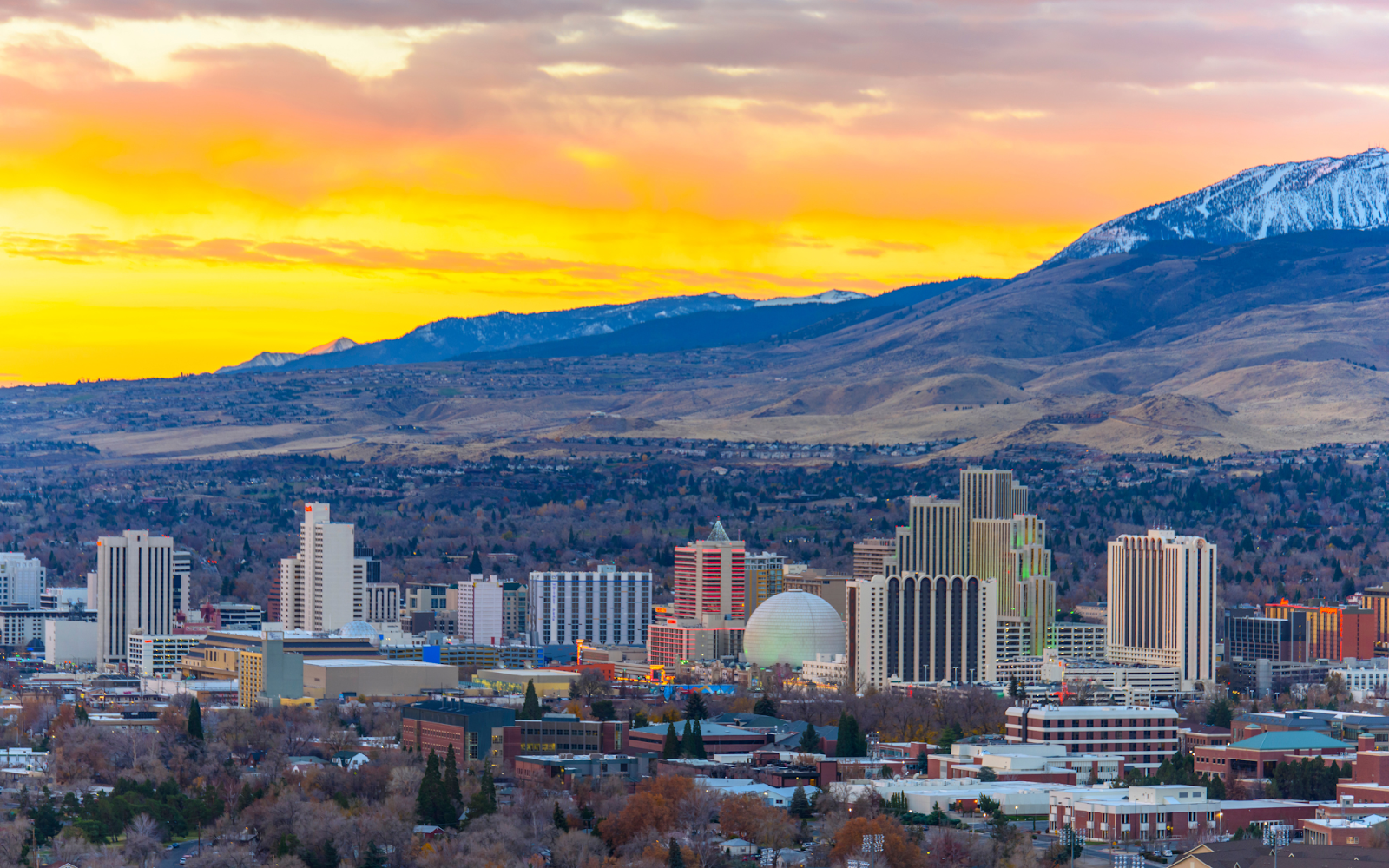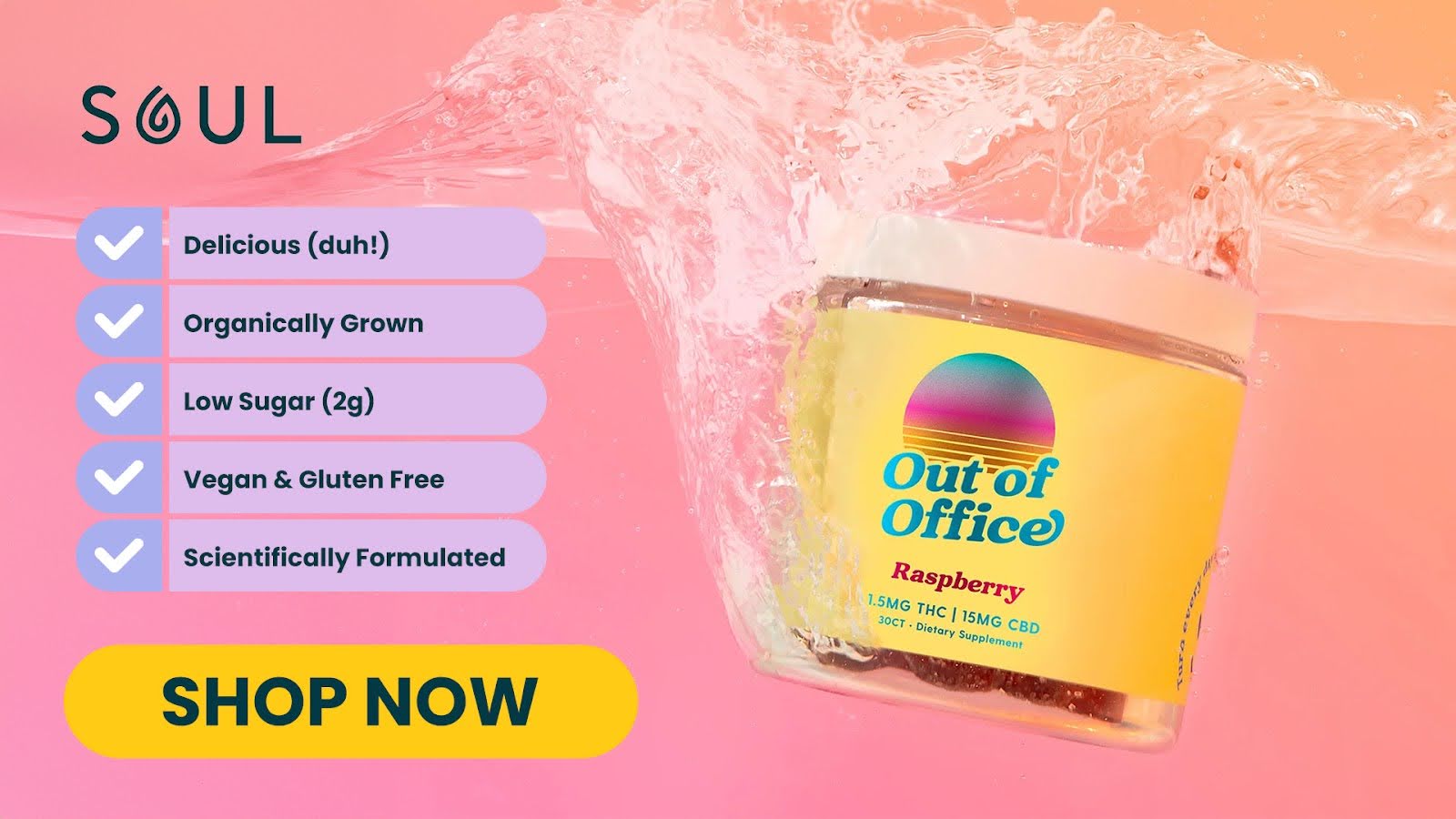
Key Takeaways:
- Age Restriction and Availability: THC is legally available to individuals aged 21 and over in Nevada, including tourists, with specific purchase and possession limits.
- Consumption and Growing Limits: Consumption of THC is restricted to private residences, and home cultivation is allowed under specific conditions.
- Interstate and Employment Laws: Transporting THC across state lines remains illegal, and employment laws in Nevada do not protect recreational THC use, underscoring the importance of knowing both state and federal laws.
Soul is a top leader in cannabis wellness and has always been known for its high-quality THC products. We understand the health benefits of cannabis very well and incorporate it into daily health routines with great care, making sure all our products meet the highest standards and follow state laws. In this article, we'll look at the rules for THC in Nevada, including its current legal status, the differences between medical and recreational use, and the laws that control its use. We'll also talk about the penalties for not following these laws, how federal laws affect state regulations, and other legal options for THC in Nevada. We aim to give you all the information you need to understand and navigate the use of cannabis in this state, offering both legal insights and practical tips.
Understanding The Difference Between Medical And Recreational Use
In Nevada, the use of THC is categorized into two distinct types: medical and recreational. Medical use of THC is designed for patients who have been diagnosed with specific medical conditions and have obtained a medical Hemp card. This allows them access to Hemp strains and products with varying levels of THC, tailored to manage symptoms such as pain, nausea, and muscle spasms.
Recreational use, on the other hand, was legalized more recently and is available to individuals aged 21 and older. It does not require a medical diagnosis or any form of prescription. Recreational users can purchase THC products from licensed dispensaries, with regulations in place to control the potency, labeling, and types of products available.
Current Laws Governing THC In Nevada
Nevada has specific regulations regarding the use, possession, and sale of THC following its legalization for recreational and medical purposes. Here's an overview of the current laws governing THC in Nevada:
Legalization Dates
Recreational use of THC was legalized in Nevada in January 2017 following voter approval of Ballot Question 9 in the November 2016 elections, marking a significant shift in the state's approach to cannabis. Medical Hemp had been legal for nearly two decades, since 2000, reflecting an earlier wave of cannabis reform that focused on therapeutic uses. The passage of these laws was seen as a turning point in Nevada's drug policy, aligning with a broader national trend towards cannabis legalization.
Purchase and Possession Limits
In Nevada, adults aged 21 and over are legally permitted to purchase and possess up to one ounce of cannabis or one-eighth of an ounce of concentrated cannabis, which includes products containing THC. These limits are designed to regulate personal use without fostering illegal resale activities. The state closely monitors these limits to ensure compliance and prevent the diversion of products into the black market.
Consumption Restrictions
The consumption of THC is legally restricted to private residences in Nevada, a regulation put in place to limit public exposure and maintain public order. Public consumption, which includes smoking or consuming edibles in open spaces or public buildings, is illegal and subject to fines. This restriction is aimed at balancing personal freedoms with public health and safety concerns.
Driving Restrictions
Driving under the influence of cannabis is illegal in Nevada, and the state enforces per se DUI laws for cannabis impairment. Blood THC levels exceeding 2 nanograms per milliliter are considered sufficient for a DUI charge. These strict regulations are intended to enhance road safety, reflecting growing concerns about the impacts of drug-impaired driving.
Licensing for Dispensaries
Nevada maintains a regulated market for cannabis, issuing licenses to dispensaries as well as cultivation and production facilities. Licensed entities are required to adhere to strict regulations concerning security measures, product labeling, and consistent product testing to ensure consumer safety. These measures are crucial for maintaining the integrity of the legal cannabis market and ensuring that products meet health and safety standards.
Penalties For THC Possession In Nevada
Nevada's laws concerning THC possession include specific penalties for exceeding legal limits and other infractions. Here’s what you need to know about the penalties for THC possession in Nevada:
Possession Over The Legal Limit
In Nevada, possessing more than one ounce of cannabis or more than one-eighth of an ounce of concentrated cannabis is not just a minor infraction; it is considered a felony for recreational users. Such offenses can lead to severe penalties, including substantial fines and imprisonment. This strict enforcement aims to curb illegal distribution and maintain the regulated use of cannabis within safe and legal boundaries.
Public Consumption
The consumption of THC in public places within Nevada is prohibited and violations typically result in a fine. For those who repeatedly offend, the penalties escalate, potentially leading to higher fines and even jail time. These laws are enforced to ensure that public spaces remain comfortable and safe for all individuals, reflecting a balance between personal freedom and public decorum.
Possession On Federal Property
Despite Nevada's state laws legalizing the use of cannabis, federal law continues to classify it as a controlled substance. Consequently, possession of THC on federal property—including national parks, federal buildings, and military installations—is illegal and enforceable under federal law. Offenders can face federal charges, highlighting the complex interplay between state and federal jurisdictions on cannabis policy.
Underage Possession
Nevada strictly prohibits the possession of cannabis by individuals under the age of 21. Penalties for underage possession are designed to deter such behavior and can include fines, community service, and mandatory participation in drug education courses. These measures reinforce the importance of legal age limits in preventing early onset of cannabis use among youth.
Driving Under The Influence
Operating a vehicle while under the influence of THC is a serious offense in Nevada. Penalties for driving while impaired by cannabis can include fines, the suspension of driving privileges, and incarceration, particularly for repeat offenders. These laws underscore the state's commitment to road safety and the serious risks associated with impaired driving.
Impact Of Federal Laws On Nevada's THC Regulations
The interaction between federal laws and Nevada's state regulations on THC creates a complex legal environment. Here’s a breakdown of how federal legislation impacts THC regulations in Nevada:
Federal Illegality
Despite the legalization of THC by Nevada state laws, it remains classified as a Schedule I controlled substance under federal law. This classification creates significant legal conflicts, particularly affecting areas such as banking, law enforcement, and interstate commerce. The discrepancy between state and federal laws complicates legal compliance for individuals and businesses, creating a persistent environment of legal uncertainty.
Banking And Business Operations
Due to federal regulations, notably the reluctance of federally regulated banks to service businesses that engage in activities still considered illegal under federal law, cannabis businesses in Nevada frequently encounter difficulties in accessing banking services. This situation forces many businesses to operate on a primarily cash basis, which poses substantial security risks and operational challenges. The lack of banking support inhibits business growth, complicates tax collection, and increases vulnerability to theft and financial discrepancies.
Law Enforcement Interactions
In Nevada, while state and local police enforce state laws that have legalized cannabis, federal law enforcement agencies continue to uphold federal laws prohibiting its use. This dichotomy can lead to legal conflicts and uncertainty, particularly in cases involving interstate activities or operations on federal property. Such scenarios underscore the complex inter-jurisdictional issues that arise from the conflicting layers of cannabis legislation.
Employment Concerns
Employers in Nevada are not obligated to accommodate cannabis use in the workplace, despite state laws legalizing its recreational and medical use. Many employers maintain strict drug-free workplace policies, partly to comply with federal regulations and to maintain eligibility for federal contracts and grants. This often means that employees can be terminated or not hired due to cannabis use, regardless of its legality under state law.
Research Limitations
Federal restrictions significantly hinder the capacity to conduct comprehensive research on THC and cannabis, impacting the development of medical treatments and regulatory policies in Nevada. The Schedule I status of cannabis restricts research funding and limits the ability of scientists to access high-quality cannabis for clinical studies, thereby delaying potential medical advancements and a deeper understanding of cannabis’ therapeutic benefits.
Legal Alternatives To THC In Nevada
In Nevada, individuals interested in legal alternatives to THC have several options available, each with distinct applications and legal statuses. Here’s an overview of these alternatives:
CBD Products
Cannabidiol (CBD) is a non-psychoactive compound found in cannabis, and it is legal in Nevada. CBD products are widely utilized for their potential therapeutic benefits without producing the euphoric high associated with THC. These products are used to aid in relieving symptoms such as chronic pain, anxiety, and inflammation, and are available in various forms including oils, edibles, and topical creams. Nevada’s regulation of CBD ensures that these products are accessible while maintaining safety and quality standards.
Hemp-Derived Products
The federal legalization of hemp, defined as cannabis containing less than 0.3% THC, has opened the doors for a variety of hemp-derived products in Nevada. These products range from textiles and building materials to food items and dietary supplements, all legally available. The burgeoning hemp industry in Nevada benefits from this legalization, providing an economic boost and offering consumers a wide range of hemp-based products that comply with both state and federal laws.
Delta-8 THC
Delta-8 THC is a cannabinoid similar to delta-9 THC but with milder psychoactive effects. While it exists in a legal gray area due to its psychoactive nature, delta-8 THC products are generally available for sale in Nevada through various retail outlets. These products provide an alternative for those seeking some of the benefits of cannabinoids without the stronger effects of traditional THC, though consumers should be aware of the varying legal interpretations by different jurisdictions.
Synthetic Cannabinoids
Synthetic cannabinoids such as dronabinol are pharmaceutical-grade products available by prescription in Nevada. Dronabinol is specifically approved for use in treating nausea and vomiting associated with chemotherapy, as well as an appetite stimulant in cases of AIDS-related anorexia. These FDA-approved medications offer controlled doses of synthetic THC, ensuring efficacy and safety for patients under medical supervision.
Kratom
While not related to cannabis, kratom is a legal botanical substance in Nevada used by some individuals for its potential effects on pain relief, mood enhancement, and anxiety reduction. However, kratom operates in a regulatory gray area and carries its own set of legal and health considerations. Users should be cautious and informed about the potential risks and legal status of kratom, which can vary significantly in different regions and states.
Future Outlook On THC Legislation In Nevada
As Nevada continues to navigate the evolving landscape of cannabis regulation, future changes in THC legislation are poised to further shape the industry and its impact on the state. Here's a look at the potential developments in THC legislation in Nevada:
- Potential Federal Legalization: There is growing advocacy and legislative movement towards federal legalization of cannabis, which could resolve many of the current legal conflicts and streamline regulations across states including Nevada.
- Expansion of Legal Uses: Nevada may see expansions in the types of legal uses for THC, including increased limits for possession and new forms of consumption as the market and public opinions evolve.
- Regulatory Improvements: Continued improvements in regulation and safety standards for THC products are expected, aiming to enhance quality control, consumer safety, and economic benefits from the cannabis industry.
- Economic Growth: The legalization and regulation of THC have already contributed significantly to Nevada’s economy through taxes and job creation. Future legislation is likely to further harness this potential for economic growth.
- Medical Research Advancements: With potential changes in federal law and more supportive state policies, increased research into THC’s medical benefits could lead to broader medical applications and acceptance.
Final Thoughts
Nevada's legal frameworks surrounding THC are still evolving, so both locals and visitors need to be aware of these developments. Responsible use requires an awareness of the differences between medical and recreational use, adherence to possession restrictions, and the implications of public consumption. People can also better understand the intricacies of THC use and regulation by taking into account the effects of federal laws and prospective changes in legislation. Nevada provides a range of legal alternatives to THC for individuals looking for alternatives or intrigued by the breakthroughs in medical and economic study. As the landscape of THC legislation continues to change, it will become increasingly important to stay informed and involved in local cannabis policies.
Read also:
Frequently Asked Questions About THC Legalization In Nevada
Is there an age limit for purchasing THC in Nevada?
Yes, individuals must be 21 years or older to legally purchase recreational THC products in Nevada.
Can tourists buy THC products in Nevada?
Yes, tourists who are 21 and older can legally purchase THC products from licensed dispensaries in Nevada, just like residents.
Are there limits to how much THC one can grow at home in Nevada?
Yes, Nevada residents are allowed to grow up to six Hemp plants per person, with a maximum of twelve plants per household, provided they reside more than 25 miles from a licensed dispensary.
Can I use THC at casinos in Nevada?
No, casinos in Nevada adhere to federal regulations which do not permit the consumption of cannabis on their premises.
Is it legal to transport THC products across state lines from Nevada?
No, transporting THC products across state lines is illegal under federal law, even if both states have legalized Hemp.
Are there employment protections for THC users in Nevada?
Nevada law does not require employers to accommodate cannabis use in the workplace, and employees can be subject to company policies, including drug testing.
Do THC products in Nevada have to meet specific quality standards?
Yes, all THC products sold in licensed Nevada dispensaries must undergo rigorous testing for potency and contaminants to meet state safety standards.
What should I do if I’m charged with a THC-related offense in Nevada?
It's advisable to consult with a legal professional who specializes in drug laws in Nevada to understand your rights and the potential consequences.
How has THC legalization impacted crime rates in Nevada?
Studies and data are mixed, with some showing a decrease in drug-related arrests since legalization, while overall crime rates are influenced by multiple factors.
Can I consume THC in public parks in Nevada?
No, the consumption of THC in public spaces, including parks, is illegal in Nevada and can lead to fines or other penalties.
Sources:
- Hansen, C., Alas, H., & Davis Jr., E. (2021, June 30). Where Is Marijuana Legal? A Guide to Hemp Legalization. US News & World Report. https://www.usnews.com/news/best-states/articles/where-is-Marijuana-legal-a-guide-to-Hemp-legalization
- Washington DC Hemp Laws | WashingtonDCCannabis.org. (n.d.). Washington D.C. Cannabis Information Portal. https://washingtondccannabis.org/laws
- Inc, G. (2021, November 4). Support for Legal Marijuana Holds at Record High of 68%. Gallup.com. https://news.gallup.com/poll/356939/support-legal-Marijuana-holds-record-high.aspx
- Dorbian, I. (n.d.). Despite Some Stumbles, Total Sales In U.S. Cannabis Market Could Soar To $50.7 Billion By 2028, Says Top Researcher. Forbes. Retrieved October 18, 2023, from https://www.forbes.com/sites/irisdorbian/2023/02/15/despite-some-stumbles-total-sales-in-us-cannabis-market-could-soar-to-507-billion-by-2028-says-top-researcher/?sh=1f90e293164d






